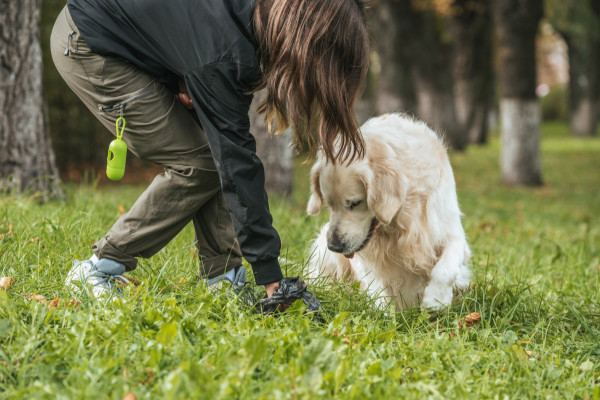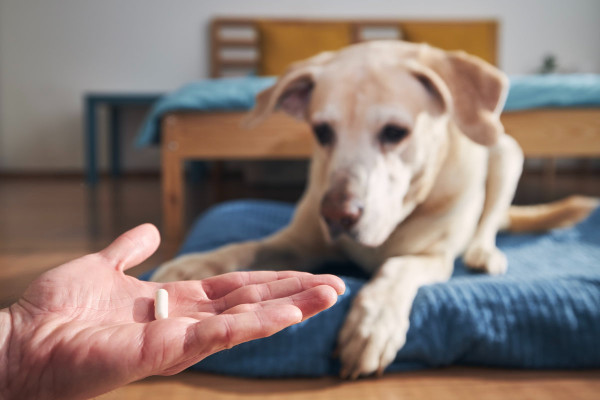Stress colitis in dogs, as the name implies, occurs when a dog develops diarrhea (which may be bloody or contain mucous) as a result of some type of stress. Integrative veterinarian Dr. Julie Buzby discusses the causes, symptoms, diagnosis, treatment, and prevention of stress colitis in dogs.

Picture this: You just arrived home from a road trip with your canine bestie, the oil light is blinking red on your vehicle, and you have an unexpected work deadline. And now your dog has diarrhea. Or here is another scenario: You’ve been busily preparing your home for out-of-town guests and your plumbing suddenly backs up. And your dog’s plumbing is malfunctioning too—doggy diarrhea all over the floor.
Other than dog diarrhea, what do both of these situations have in common? Stress! In dogs, sometimes stress can manifest as GI signs, or more specifically, in a condition aptly named stress colitis in dogs.
What is stress colitis in dogs?
Stress colitis is inflammation of the colon or large intestine (i.e. colitis) that occurs due to stress. As a result of the inflammation and changes in the bacterial population, the dog may develop diarrhea. This “stress diarrhea” may be bloody or contain mucous, and tends to cause frequent bowel movements and straining.
How does stress cause diarrhea?
It may sound a bit crazy that stress can cause diarrhea. But your dog’s digestive tract and nervous system are closely tied together. This means that when something, in this case stress, impacts the nervous system, it can have an effect on the small and large intestines too.
Stress is defined as any internal or external condition that changes the status quo. From your dog’s perspective, a normal state is when he or she is calm, relaxed, and happy. When stressful events happen, the dog may become anxious, nervous, or scared. And his or her “fight or flight” instincts may kick in.
As part of the “fight or flight” response, the nervous system slows digestion. And it redirects blood flow away from the GI tract and toward the muscles or other parts of the body needed to either fight or run away. The result can be inflammation in the colon and changes in the colonic bacterial population.
Normally, the colon is primarily responsible for absorbing water, vitamins, and electrolytes from the ingesta (i.e. material the animal eats). Plus, it also helps remove waste from the body by forming and storing stool that is then moved to the rectum for elimination.
However, when the colon becomes inflamed, it can’t do its job as well. More fluid tends to remain in the colon in colitis, hence the runny stools (i.e. diarrhea). And there is an increase in the permeability of the mucosal layer of the inside of the colon. Because of this, dogs with colitis can lose important nutrients in their stools. And the colonic inflammation may also lead to bloody diarrhea or increased amounts of mucous in the stool.
What causes stress colitis?
As you can imagine, a wide range of situations can be stressful for dogs, and therefore lead to stress diarrhea. Some of the more common causes of stress colitis in dogs include:

- Boarding or playing in a daycare facility
- Traveling on a plane or going on a long car trip
- Being hospitalized or confined
- Recovering from surgery
- Environmental changes (e.g., new home, new baby, new pet, death in the family, guests)
- Fireworks, thunderstorms, or other noisy events
- Discomfort from other illnesses or injuries
- Exciting events (e.g. playing with a new dog, having a new experience)
Based on this list, it is probably no surprise that canine stress colitis affects dogs of all ages, sexes, and breeds. However, puppies and older dogs may have a slightly higher risk due to having weaker immune systems. There aren’t any specific breeds that are more likely to develop stress colitis. But the risk is higher for breeds who are more prone to anxiety.
What are the symptoms of stress colitis in dogs?
Most of the time with stress colitis, you may notice that your dog is having diarrhea but acting fine. The only symptoms might be those surrounding the diarrhea, including:
- Increased frequency and urgency of bowel movements
- Loose stool, which may be cow patty-consistency or almost liquid
- Straining to defecate (i.e. tenesmus)—It may look like your dog is having trouble getting stool out, which could cause you to wonder if your dog is constipated. However, this is not usually the case.
- Increased mucous in the feces (small amounts are normal as mucus helps the stool slide out, but large slimy globs of mucous indicate colonic inflammation)
- Streaks of bright red blood in the diarrhea (not dark red to black digested blood, which comes from higher in the GI tract)
Usually, the dog retains his or her normal appetite. But occasionally, dogs with stress diarrhea may have mild loss of appetite, especially if they are also vomiting. Or they may show signs of abdominal discomfort (e.g. having an abnormal posture or stretching out). And being a lethargic dog or increased gassiness are also possible. However, since it is short-lived, most dogs with stress colitis don’t experience significant weight loss.
Acute colitis is not a deadly condition but, if left untreated, it can lead to serious dehydration and depression. Plus, many of the symptoms of stress colitis can also be associated with other illnesses.
Therefore, it is important to reach out to your veterinarian if your dog is having diarrhea that is severe or doesn’t resolve within a few days, or if you have any other concerns. And when you head into the vet for the appointment, be sure to bring a stool sample. Fecal tests are often an important part of the diagnostic process.

How is stress colitis diagnosed?
If your canine companion’s only symptom is mild diarrhea, your veterinarian may make a diagnosis of stress colitis based on your dog’s medical history, examination findings, and a lack of parasites on fecal tests for dogs.
However, if there are additional clinical signs, or if your dog doesn’t respond to initial therapy, your vet may suspect other causes of colitis, including:
- Infectious diseases (viral or bacterial)
- Intestinal parasites in dogs
- Toxin exposure or dietary indiscretion (e.g. getting into the trash, counter surfing, eating something on a walk, etc.)
- Irritable bowel syndrome (IBS)—which is very similar to stress colitis
- Acute kidney failure in dogs or acute liver disease in dogs
- Inflammatory bowel disease (IBD in dogs)
- Addison’s disease in dogs (hypoadrenocorticism)
- Cancer or other GI disorders
To rule out some of the other causes of colitis, your veterinarian may recommend blood tests for dogs, X-rays, or ultrasound. And for cases of chronic colitis in dogs, colonoscopy and/or biopsies might be necessary to look for IBD or cancer.
What is the treatment for stress colitis in dogs?
If stress colitis is the culprit, treatment is two-fold. It involves both treating the symptoms and addressing the underlying cause—stress. In other words, we need to take steps to manage the diarrhea. But it’s also important to either eliminate the stressor, lessen its intensity, or find ways to improve your dog’s response to the stressor.
In most cases, treatment for stress colitis includes some combination of an anti-diarrheal medication, fiber supplementation, probiotics, and a bland diet, plus stress reduction.
Anti-diarrheal medications
Many of the most effective anti-diarrheal products will contain fiber (to firm up stool), probiotics (to improve the bacterial content of the intestines), and/or kaolin (an ingredient that reduces intestinal inflammation). These diarrhea remedies can come in a liquid or tablet form, depending on the product. Or some probiotics come in a fine powdered form.

It is important to only give your dog veterinarian-prescribed anti-diarrhea medications, not over the counter anti-diarrheal medications for humans, unless instructed otherwise by your vet. Using Pepto-Bismol® for dogs could cause black stools and further stomach upset. And while Imodium® is very powerful and can work for some dogs, it should only be given if recommended by your veterinarian.
Fiber supplementation
The vet may recommend increased dietary fiber for dogs with stress colitis. This can be a great natural way to help improve fecal consistency and the movement of foodstuffs and waste through the colon. Fiber is also known to help aid metabolism in bacteria present in the colon.
You can give your dog a fiber supplement such as powdered psyllium (e.g. unflavored Metamucil® for dogs). However stay away from flavored, sugar-free, or gummy formulations of Metamucil. These products may contain harmful ingredients such as xylitol (i.e. birch sugar), which is toxic for dogs.
Alternatively, you can look for a higher-fiber commercial and prescription dog food.
Bland easily-digestible diet
In some cases, the vet may recommend fasting your dog for 12-24 hours and then starting to feed him or her a bland diet for dogs. Or in other situations, the vet may recommend giving your dog a bland easily-digestible diet right away.
There are numerous prescription diets available that are higher in fiber and contain probiotics and prebiotics while also being specifically formulated to be easier to digest than the average commercial diet. These can be a great (and convenient) option. Alternatively, you can make a home-cooked bland diet such as skinless boiled chicken and boiled rice.
With either diet option, the vet will mostly likely have you gradually transition to your dog’s normal food after about three to five days (or sometimes longer depending on how your dog is doing).
Probiotics
Colonic health is tied to the health of its bacterial population. However, in colitis, the bacterial population may become abnormal. Therefore, your vet may suggest a probiotic supplement to help replenish the “good” bacteria in your dog’s gut.
Decreasing your dog’s fear, anxiety, and stress
As mentioned earlier, it is important to control your dog’s stress level as much as possible. Removing the source of stress is ideal, but understandably it isn’t always possible. Therefore, especially if your dog is prone to stress colitis, your vet may also talk to you about calming medications, supplements, or even anxiety medications (e.g. trazodone for dogs).
Antibiotics
Veterinarians used to prescribe antibiotics such as metronidazole to treat colitis in dogs. But this practice is falling out of favor. Current research indicates antibiotics aren’t as helpful as was once believed, and may even negatively impact the gut bacteria. Plus, antibiotics could worsen diarrhea in some cases.
Treatment for other causes of colitis
If the blood work, fecal tests, or other diagnostics reveal another contributing factor, the vet will address it as well. For example, he or she may prescribe a dewormer, anti-inflammatories, or a hypoallergenic diet for some causes of colitis.
How long does stress colitis in dogs last?
An episode of stress colitis is certainly stressful for you and your dog while it is going on. But the good news is that on average a dog may only experience symptoms for three to five days. In many cases, symptoms resolve with just symptomatic treatment such as an anti-diarrheal medication and a bland diet.
However, if symptoms do not improve or start to worsen, please contact your veterinarian. This could mean that there is a different type of colitis at play or that your dog has another underlying condition that is preventing the diarrhea from resolving fully.
How can you prevent stress colitis in dogs?
While usually short-lived, it still makes sense to take steps to prevent (or at least reduce the severity of) further episodes of stress colitis.

8 Stress colitis prevention tips
Some stress colitis prevention tips include:
- Ask your vet about calming supplements or anti-anxiety medications—Often your vet will recommend using anxiety-reducing medications or supplements prior to and after stressful events (e.g. company coming over, new baby, fireworks, travel, vet visits, etc.).
- Find a way to lessen the anxiety-producing stimuli—For some dogs, having a dog-sitter might be less stressful than going to the boarding kennel. And you don’t have to take your dog to the dog park or for a play date if it stresses him or her out.
- Consult a veterinary behaviorist or veterinarian-recommended dog trainer—These behavior experts can help you learn how to manage the environment and work with your dog to decrease stress around certain situations.
- Consider long-term use of prebiotics and probiotics—Helping keep the gut flora healthy with prebiotics and probiotics may reduce flare-ups of stress colitis.
- Feed your dog a prescription gastrointestinal diet long-term—Many of the bland, easily-digestible diets are safe for continuous use. This can be a good way to support your dog’s GI tract.
- Create a calm environment for your dog—Play relaxing music or use a dog calming pheromone spray, collar, or diffuser to promote a sense of calm.
- Partner with your vet to create a plan for potential stress colitis events—It can be helpful to have anti-diarrhea medication, a few cans of a GI prescription diet, a fiber supplement, or a probiotic on hand and know how and when to use them. Hopefully, that way you can head off a full-blown episode of stress colitis.
- Keep a journal of episodes—Make a note of when your dog has stress colitis and what was going on around that time. Sometimes this can help you identify a trigger you may not have been aware of.
Take some of the stress out of stress colitis
If it seems like your dog is prone to stress colitis, why not discuss it with your vet? Together you can make a plan to reduce your dog’s stress level. Then, as you implement the plan, you can always make modifications as needed.
By understanding why dogs get stress colitis, what your dog’s particular triggers are, and how to treat and prevent stress colitis, you can take some of the “stress” out of stress colitis.
Does your dog struggle with stress colitis?
Please comment below.


Our senior dog just recently had a terrible bout of bloody diarrhea while we were traveling out of town for work. Our son , who lives with us, took care of him while we were away as he usually does. We had all the tests run and the vet determined it is anxiety. The problem is, as he’s gotten older, he’s gotten a little more aggressive, and clingy and had bouts of defecating in the house. How do you remove stress from an anxious dog when the stress is when we have to travel for work pretty consistently?
Hi RCourt,
I understand your concern and think it is good you are reaching out for support. Each dog is different and what works for one might not work for another. So, when it comes to anxiety treatments, often it is a bit of trial and error to find the right fit. There are anti-anxiety medications such as trazodone, supplements and CBD products, and even calming collars, sprays, jackets, treats, and diffusers. I encourage you to discuss this with your vet and see what they recommend. I am very hopeful that you can find a way to offer your senior guy relief. Best wishes to you both!
My Westie has been dealing with stress colitis for close to 10 years. It was a constant battle.
Normally, the vet would put him on Flagyl and it seemed to do the trick. Since we moved last year, we had to find a new vet. She recommended we start feeding him Science Diet W/D dry food. It has been life changing for both of us. His colitis only acts up once in a blue moon, and when it does, it’s here and gone. I wish I had known about this food years ago.
Dear Denise,
I am sorry your Westie has been living with this difficult disease for so many years. What a blessing the food has made such a huge improvement in his health and quality of life. Thank you for sharing your experience with us. You might just save someone else several years of frustration by offering this great advice. Wishing your sweet boy continued success and keep up the good work!
Our 9 month old Toy Poodle has recently became so easy to startle. He barks and cries incessantly if left alone for even very short periods of time. My husband drives me to work and we take him along to try to help that. He sometimes vomits on the way or way home. He woke up lethargic with no appetite this am. He just had. a large episode of diarrhea. We’re very concerned and appreciate your advice. Thank you very much!!
Dear Deborah,
I understand your concern for your senior pup. What you describe sounds worrisome to me as well. I strongly recommend you contact your vet right away and have your boy evaluated. Hoping all is well and praying for a positive outcome.
I have a 13 month old toy poodle with crazy anxiety. I brought a puppy home last week and my poodle started having bloody, mucus stools last night. Only two so far in 6 hours. He also hasn’t eaten much in 24 hours. Not sure how long to wait before taking him in, if I even need to?
Hi Brooklynn,
I am sorry your poodle suffers with anxiety and is now dealing with GI issues too. While I agree this could be stress colitis, there is no way to know for sure without ruling out other possible causes first. I think it would be wise to go ahead and call your vet. Also, is your poodle up to date on vaccines? I ask because puppies can sometimes expose older dogs to different viruses and diseases. Hoping you can get your boy the care he needs. Wishing you and yours all the best.
I have a 18 month male shi-poo, who jumps and is frightened at unexpected noises, he seems really down at times and it feels like he is anxious,He is very nervous at times while we are out and about. If I’m sat with him he seems a lot better and while playing he is fine, any advice would be appreciated.
Hi Manda-moo,
I am sorry your little pup is living with so much anxiety. Unfortunately, this type of behavior is fairly common especially with puppies that were not exposed to different situations during the critical development period between 3-6 weeks of age. There may be ways to help him cope with stress with training and behavior modification. You also want to make sure you are not reinforcing this worrisome behavior by accidentally rewarding him with affection and praise while he is displaying the problem behaviors. I would recommend you schedule a consultation with a veterinary behaviorist for more help and guidance. There are also calming collars, sprays, supplements, etc. that may offer some benefits. Hoping you can find a way to help your sweet boy adjust to life a bit better. Best wishes and good luck!